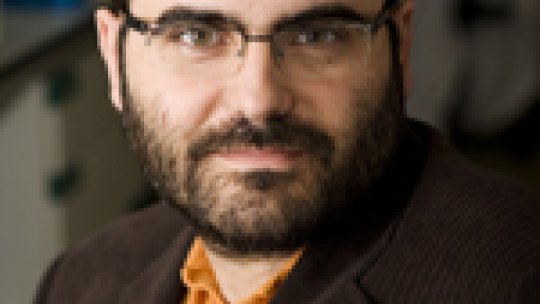Images
Contact

His studies address the initiation and progression of colon cancer, one of the tumours with greatest incidence worldwide.
Today the scientist Eduard Batlle, ICREA researcher at the Institute for Research in Biomedicine (IRB Barcelona), will be awarded the V Banc Sabadell Prize for Biomedical Research for his studies on cancer of the colon. In an act to be held this evening at the Fundació Antoni Tàpies, the president of the “Banc Sabadell”, Josep Oliu, will present the prize, which has a value of 50,000 euros. The ceremony will also be attended by the Minister of Health of the Generalitat de Catalunya, Marina Geli, the director of the Fundació Banc Sabadell, Miquel Molins, the president of the jury, Josep Baselga, and the director of IRB Barcelona, Joan J. Guinovart, among other authorities.
Since 2005 Eduard Batlle has been the Coordinator of the Oncology Programme and head of the Colorectal Cancer Lab at IRB Barcelona. His lab studies the onset of colon cancer and its progression from initial stages to the formation of aggressive tumours. With the aim to design new diagnostic and therapeutic tools, his team develops and examines cell and animal models that mimic this kind of cancer. In 2008, Eduard Batlle was awarded funding of more than 1 million euros over five years through a European Research Council Starting Grant to further the study intestinal stem cells and their relation with colon cancer.
Batlle’s lab has three main lines of research. The first is to identify and distinguish intestinal stem cells of colorectal cancer with the aim to unveil the relations between cell renewal of the intestinal epithelium and the initiation and progression of colon cancer. A second line addresses the identification of suppressors that inhibit the malignant growth of colorectal tumours. With the third line of research, the team of scientists seeks to identify the genetic programme that allows stem cells to metastasise to the liver. This last line is linked to the development of new therapeutic strategies to block the most aggressive phase of the disease.
Colorectal Cancer (CRC) is one of the leading causes of death by cancer worldwide. Most colorectal tumours develop as benign lesions but a small proportion progress to more malignant stages when the appropriate alterations in oncogenes and tumour suppressor genes occur. The final and deadliest step in colorectal cancer progression is the metastatic dissemination of colorectal cancer cells to other organs, mainly the liver.
Eduard Batlle (Barcelona 1970) holds a PhD in Biology from the University of Barcelona. He did his first post-doc stage, of almost two years, at the Institut für Molekularbiologie und Tumorforschung, in Marburg, Germany, and then spent four additional years at the Netherlands Institute for Developmental Biology, in Utrecht, with the researcher Hans Clevers. He has published papers in a number of prestigious biomedical journals with impact factors over 20, among which special mention is given a cover of the journal Cell and several articles in Nature. The studies published in recent years have more then 2,000 citations and have been the focus of revisions and numerous comments in top-class scientific journals. In 2006, Batlle received the “Debiopharm Life Sciences Award for Outstanding Research in Oncology”, awarded by the Ecole Polytechnique Fédérale de Lausanne (EPFL) in Switzerland.
Informative dossier on the 2010 Biomedical Research Prize (Fundació Banc Sabadell; PDF in Spanish)
About IRB Barcelona
The Institute for Research in Biomedicine (IRB Barcelona) pursues a society free of disease. To this end, it conducts multidisciplinary research of excellence to cure cancer and other diseases linked to ageing. It establishes technology transfer agreements with the pharmaceutical industry and major hospitals to bring research results closer to society, and organises a range of science outreach activities to engage the public in an open dialogue. IRB Barcelona is an international centre that hosts 400 researchers and more than 30 nationalities. Recognised as a Severo Ochoa Centre of Excellence since 2011, IRB Barcelona is a CERCA centre and member of the Barcelona Institute of Science and Technology (BIST).





